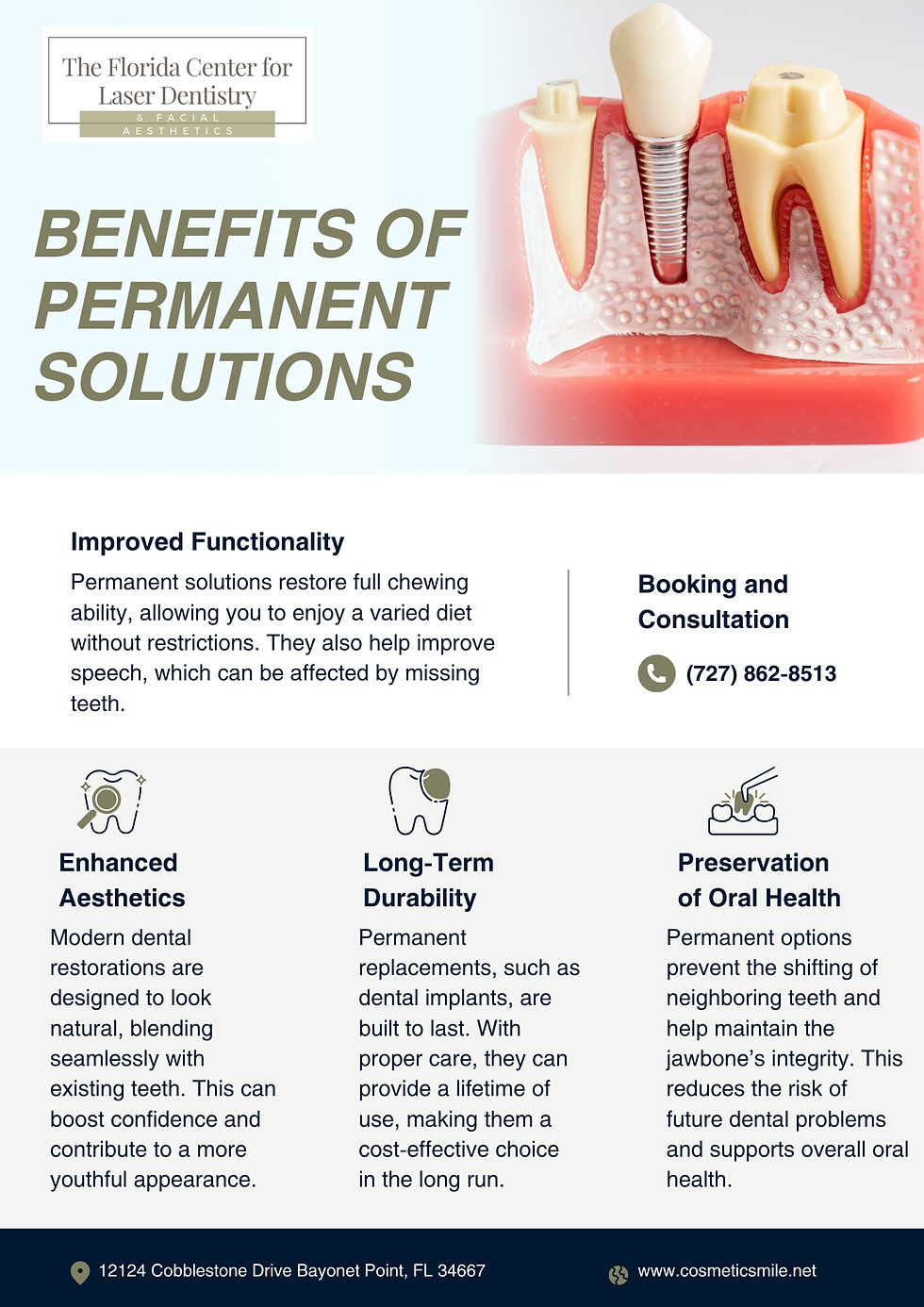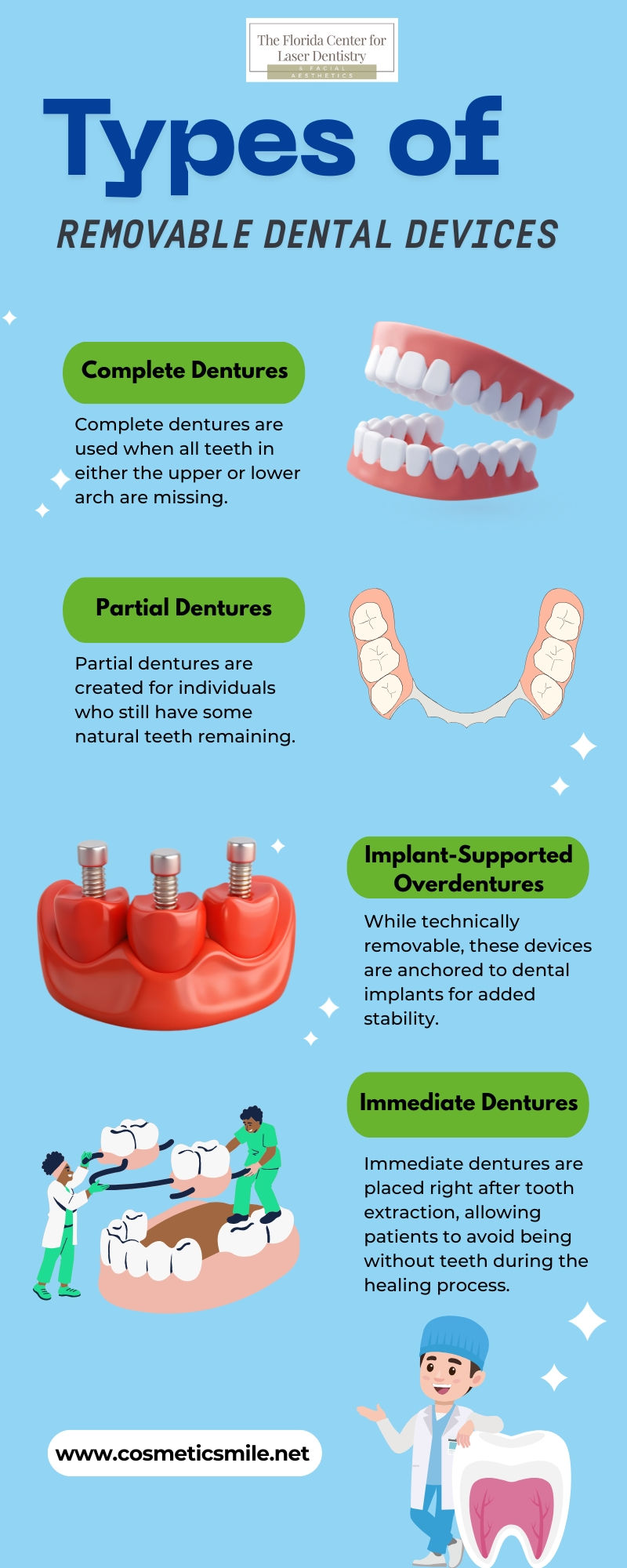Understanding the Benefits of Replacing Missing Teeth
- Cosmetic Smile
- Nov 19, 2024
- 5 min read
A missing tooth can be more than just an aesthetic concern; it can impact your overall oral health, speech, and even confidence. While some people may choose temporary fixes, others look for long-term solutions to restore functionality and improve their smiles. Among these options, permanent tooth replacement has emerged as a reliable and effective approach for achieving natural-looking, durable results.
Tooth loss can occur due to various reasons, such as injury, decay, or gum disease. Regardless of the cause, living with missing teeth can pose challenges. It can make chewing certain foods difficult, leading to dietary restrictions that may affect nutrition. Additionally, missing teeth can alter the alignment of surrounding teeth, potentially causing bite issues over time. This is why addressing the gap promptly is crucial to maintaining oral health and preventing further complications.
The Impact of Missing Teeth on Oral Health
When a tooth is lost, the surrounding jawbone in the affected area begins to deteriorate over time. This process, known as bone resorption, occurs because the bone no longer receives stimulation from chewing forces. As a result, the jaw may shrink, leading to changes in facial structure and a sunken appearance. This effect not only impacts aesthetics but can also make wearing removable prosthetics, such as dentures, uncomfortable.
Furthermore, gaps left by missing teeth can create spaces where food particles and bacteria accumulate. This increases the risk of gum disease and tooth decay in the remaining teeth. In some cases, the neighboring teeth may shift into the empty space, causing misalignment that affects the bite and jaw joint.
Modern Solutions for Missing Teeth
Advancements in dental technology have made it possible to offer solutions that mimic the appearance and function of natural teeth. These options provide stability, comfort, and durability, making them ideal for individuals seeking long-lasting results.
Dental Implants
Dental implants are one of the most popular and effective solutions for replacing missing teeth. They involve inserting a titanium post into the jawbone, which acts as an artificial tooth root. Once the implant integrates with the bone, a crown is placed on top, creating a replacement that looks and functions like a natural tooth.
One significant advantage of dental implants is their ability to prevent bone loss. The implant stimulates the jawbone, preserving its density and structure. Additionally, implants are highly durable and can last for decades with proper care.
Fixed Bridges
A fixed bridge is another option for filling the gap left by a missing tooth or teeth. This involves creating a bridge that is anchored to the natural teeth on either side of the gap. The replacement tooth, or pontic, is suspended between the anchoring teeth, restoring both appearance and functionality. While bridges are less invasive than implants, they rely on the health of the adjacent teeth for support.
Removable Prosthetics
For individuals who may not be candidates for implants or fixed bridges, removable options like partial or complete dentures can be considered. Although these solutions are not permanent, they can provide a temporary fix that improves appearance and function. However, they require regular adjustments and may not offer the same level of stability as other methods.

Benefits of Permanent Solutions
Choosing a permanent option for replacing missing teeth offers several advantages that extend beyond appearance. These benefits include:
Improved Functionality: Permanent solutions restore full chewing ability, allowing you to enjoy a varied diet without restrictions. They also help improve speech, which can be affected by missing teeth.
Enhanced Aesthetics: Modern dental restorations are designed to look natural, blending seamlessly with existing teeth. This can boost confidence and contribute to a more youthful appearance.
Long-Term Durability: Permanent replacements, such as dental implants, are built to last. With proper care, they can provide a lifetime of use, making them a cost-effective choice in the long run.
Preservation of Oral Health: Permanent options prevent the shifting of neighboring teeth and help maintain the jawbone’s integrity. This reduces the risk of future dental problems and supports overall oral health.
The Process of Replacing a Tooth Permanently
The journey to a permanent solution typically begins with a consultation to assess your oral health and determine the most suitable option. Advanced imaging techniques, such as 3D scans, may be used to evaluate bone density and plan the procedure.
For implants, the process involves a minor surgical procedure to place the titanium post in the jawbone. After a healing period of several months, during which the implant integrates with the bone, a custom crown is attached. The result is a secure, natural-looking tooth replacement.
In the case of fixed bridges, the dentist prepares the supporting teeth by reshaping them and taking impressions to create a custom-fit bridge. Once the bridge is fabricated, it is cemented in place, providing a functional and aesthetic solution.
Caring for Your New Smile
Proper maintenance is essential to ensure the longevity of your replacement and overall oral health. Good oral hygiene practices, such as brushing twice daily and flossing, are crucial. Regular dental check-ups allow your dentist to monitor the condition of the replacement and address any issues early.
For those with dental implants, maintaining healthy gums is particularly important to prevent complications like peri-implantitis, an infection that can jeopardize the implant’s stability. Following your dentist’s advice and avoiding habits like smoking can significantly enhance the success of your treatment.
Psychological and Social Benefits
Replacing missing teeth not only improves physical health but also has psychological and social benefits. Many people report feeling more confident in social situations after restoring their smile. The ability to eat, speak, and laugh without worry contributes to an improved quality of life.
Moreover, the boost in self-esteem can positively impact personal and professional relationships. A complete, healthy smile often leaves a lasting impression, making interactions more enjoyable and fulfilling.
Factors to Consider Before Choosing a Solution
While permanent solutions offer numerous benefits, it’s essential to consider certain factors before making a decision. These include:
Cost: The initial investment for procedures like implants may be higher than temporary options, but the long-term value often outweighs the cost.
Health Requirements: Adequate bone density and overall oral health are necessary for procedures like implants. Some individuals may require additional treatments, such as bone grafting, to prepare for the procedure.
Personal Goals: Your lifestyle, preferences, and expectations should align with the chosen solution to ensure satisfaction with the outcome.
Embracing a Brighter Future
Living with missing teeth can be challenging, but modern dentistry offers solutions that make it possible to regain a complete, functional smile. Whether you choose implants, bridges, or another method, replacing missing teeth can transform your oral health and overall well-being. By addressing the gaps promptly and choosing a durable solution, you invest in a healthier, more confident future.
No matter the cause of tooth loss, taking the step to restore your smile is an empowering decision that can improve your life in countless ways. With the advancements in dental care, achieving a natural-looking and lasting result is well within reach.



Comments